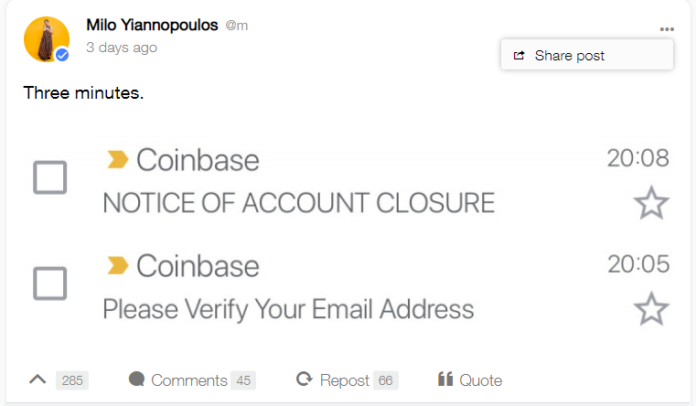[ad_1]
Coinbase, one of the most popular U.S.-based cryptocurrency exchanges, has allegedly banned the personal account of a British right-wing pundit Milo Yiannopoulos.
Yiannopoulos, who has previously made high-profile and controversial remarks which led him to having his account closed on other media platforms, posted a screenshot to Gab on May 3 detailing the sequence of events. According to the post, Yiannopoulos received an email from Coinbase to verify his email address, which was promptly followed up–three minutes later–with a sudden notice of account closure.
While Coinbase is just the latest in a series of platform barring Yiannopoulos from participating, including Facebook, Instagram and Twitter, several community members have questioned why a cryptocurrency trading platform would find need to do the same. According to an article published by the Guardian, a Facebook spokesperson claimed that the Yiannopoulos banning at the time was apart of a series of crackdowns on individuals and organizations promoting violence and hate, “regardless of ideology.”
Nonetheless, Yiannopoulos and his account closures have drawn significant interest given his political leanings. The British pundit is an outspoken right-wing supporter and political commentator, who previously wrote for the Conservative news site Breitbart.
Yiannopoulos is also not the first personal account to be closed by Coinbase. In January 2019, the official Twitter account for Gab–a social media platform that prides itself on a lack of censorship–announced that Gab founder Andrew Torba had his personal account suspended by Coinbase. Even more puzzling, the merchant account for Gab was also banned, leading the company to claim that “decentralized exchanges are the future”:
As predicted: the on ramps and off ramps (exchanges) are going to start censoring not only companies, but also individuals.
@coinbase has now banned both Gab’s merchant account and Andrew Torba’s personal account.
Decentralized exchanges are the future.
As a private enterprise, Coinbase is free to decide who can operate on their platform or benefit from their client services. However, given the decentralized ethos of cryptocurrency, many community members are concerned with the exchange’s decision to ban personal accounts without explanation, or for what gives the appearance of particularly ideological targeting.
Ironically, the decision by Coinbase to exclude certain personal accounts appears to add to the argument in favor of decentralized exchanges (DEXs). DEXs allow investors to buy, sell and trade cryptocurrency in a completely decentralized marketplace, without the intermediaries such as Coinbase and other companies operating trading platforms. As one user pointed out in the comments on CoinTelegraph, Coinbase’s actions “[prove] the points people were making about why a “big crypto” service like Coinbase defeats the purpose of crypto.”
Other users have pointed out to Yiannopoulos alternative routes for accepting and particpating in cryptocurrency. While Coinbase offers a convenient service for merchants and other client-based features, cryptocurrency was ultimately designed to be transferred and transacted outside centralized portals. Milo has yet to provide any more updates on the situation, but the community of crypto will continue to follow Coinbase’s actions in regard to personal accounts moving forward.
[ad_2]
Source link
